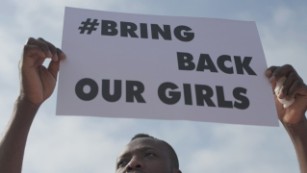Story highlights
- Nigeria’s president vowed that Boko Haram would be beaten by the end of 2015
- But terror group has continued to mount attacks, despite efforts of Nigerian military
- Critics say corruption, lack of coordination among factors which have helped Boko Haram flourish
It was a promise that the Nigerian head of state would also reiterate to fellow Nigerians, who eagerly waited for him to make good on his promise and act with the decisiveness that Buhari had accused his predecessor, Goodluck Jonathan, of lacking. Yet as 2015 drew to a close, the specter of Boko Haram loomed as large as ever over Africa’s most populous state.
Indeed, less than 48 hours after the Buhari regime announced that it had fulfilled its vow of defeating the group, at least 50 people were killed in a wave of violence in Nigeria’s insurgent-embattled Borno and Adamawa states. Those skeptical of Boko Haram’s defeat were vindicated, those residing within the terrorists’ deadly reach continue to live in fear.
Nigeria’s information minister, however, downplayed the December 27 attacks and further reaffirmed that Boko Haram was on the precipice of being “wiped out.” Lai Mohammed claimed to local media that all insurgent-held territory had been reclaimed and that Boko Haram no longer possessed the operational capabilities to achieve its raison d’etre, the creation of a “dawlah” — or Islamic-state — in north-eastern Nigeria.
The problem with Mohammed’s “impending demise” narrative is that it equated loss of territory with defeat. Prior to Boko Haram’s capture in July 2014 of Damboa, the first Nigerian town to fall to the extremist sect, its near decade-long insurgency had been characterized by traditional guerilla warfare. The group’s favoured modus operandi had been suicide bombings and hit-and-run raids, not the capture and control of territory.
The acts of violence which the Nigerian government has derided as indicative of Boko Haram’s weaknesses are actually the very mechanisms which have made it one of the — if not the — deadliest terrorist organizations in the world.
Apart from being face-saving exercises, accounts of Boko Haram’s imminent destruction may also be an attempt by the Buhari regime to misdirect attention from the myriad issues which have — and continue to — hamper its counter-insurgency strategy.















